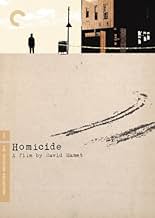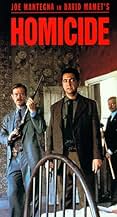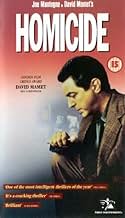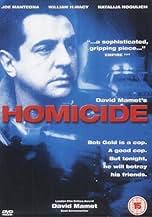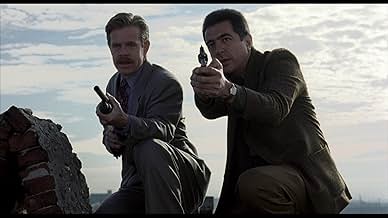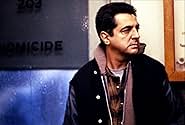IMDb रेटिंग
6.9/10
8.6 हज़ार
आपकी रेटिंग
अपनी भाषा में प्लॉट जोड़ेंA Jewish homicide detective investigates a seemingly minor murder and falls in with a Zionist group as a result.A Jewish homicide detective investigates a seemingly minor murder and falls in with a Zionist group as a result.A Jewish homicide detective investigates a seemingly minor murder and falls in with a Zionist group as a result.
- पुरस्कार
- 3 जीत और कुल 6 नामांकन
फ़ीचर्ड समीक्षाएं
Some David Mamet films have incredible notoriety amongst the literate set (Glengarry Glen Ross, Oleanna, House of Games). His 2 Oscar noms (Wag the Dog, The Verdict) as well as his non-nominated script for The Untouchables have him firmly established with Hollywood's power base as well.
For my money, the oft-overlooked Homicide is a true Mamet gem--startling in its genius.
Put simply, Homicide is a revealing look at a man's journey into himself. Many will be distracted by the subject matter and tune out, but try to hang on.
Joe Mantegna's Bobby Gold is a tough cop who denies his Jewish lineage, until a low priority murder investigation into an aged Holocast survivor forces him to re-evaluate his entire existence. The resulting destruction of the man is cruel and never-ending, and brilliant.
William H. Macy, an until-now bit player, gets a well-deserved promotion to #2 man among the strong supporting cast as Gold's partner and sounding board.
The intricacies of the plot, the subtleties of the subtext, as well as the perfunctory Mamet attention to detail may mean a second, or third look is necessary for the viewer to get straight with what's going on------- but take the time, if you can, it just keeps getting better and better.
For my money, the oft-overlooked Homicide is a true Mamet gem--startling in its genius.
Put simply, Homicide is a revealing look at a man's journey into himself. Many will be distracted by the subject matter and tune out, but try to hang on.
Joe Mantegna's Bobby Gold is a tough cop who denies his Jewish lineage, until a low priority murder investigation into an aged Holocast survivor forces him to re-evaluate his entire existence. The resulting destruction of the man is cruel and never-ending, and brilliant.
William H. Macy, an until-now bit player, gets a well-deserved promotion to #2 man among the strong supporting cast as Gold's partner and sounding board.
The intricacies of the plot, the subtleties of the subtext, as well as the perfunctory Mamet attention to detail may mean a second, or third look is necessary for the viewer to get straight with what's going on------- but take the time, if you can, it just keeps getting better and better.
Not that I thought Joe was incapable of acting, but it's a little hard to take a guy seriously after seeing them in junk like "Baby's Day Out." Nevertheless, he gives a wonderful performance in this very intriguing film that was written and directed by "The Spanish Prisoner's" David Mamet.
Like "The Spanish Prisoner", "Homicide" is a movie that must be paid attention to at all times or you will miss tiny, but very important details. I will admit that I missed a few of these details, but since I watched it in a film class, we discussed it the next day and other people pointed them out. Anyway, this style of work seems to be David Mamet's "signature" and I think it's great. I hope he wins an award some day.
Getting back to the movie, besides containing numerous small details, "Homicide" is a genuinely interesting story about a Jewish cop who has gotten out of touch with his religious side. It is only after he is assigned to a case involving a murdered Jewish woman, does he finally began to get in touch with his roots. Of course there is struggle, not to mention people who do not appear to be what they seemed. It's a good movie, though a little hard to get into at first, but don't let your mind wonder, or you could be missing a vital element to the plot.
Like "The Spanish Prisoner", "Homicide" is a movie that must be paid attention to at all times or you will miss tiny, but very important details. I will admit that I missed a few of these details, but since I watched it in a film class, we discussed it the next day and other people pointed them out. Anyway, this style of work seems to be David Mamet's "signature" and I think it's great. I hope he wins an award some day.
Getting back to the movie, besides containing numerous small details, "Homicide" is a genuinely interesting story about a Jewish cop who has gotten out of touch with his religious side. It is only after he is assigned to a case involving a murdered Jewish woman, does he finally began to get in touch with his roots. Of course there is struggle, not to mention people who do not appear to be what they seemed. It's a good movie, though a little hard to get into at first, but don't let your mind wonder, or you could be missing a vital element to the plot.
I am a huge fan of Mamet and there's an excellent cast - even the mighty Roger Deakins as DOP. But this movie doesn't work. The dialogue is stilted and forced - surely the last thing you'd expect from a Mamet script - the main character is weak and not credible as a detective. The plot is all over the place and the ending highly unsatisfactory.
Bobby Gold, a jewish homicide detective involved in tracking down a cop killer, stumbles onto the shooting of an elderly jewish lady. Although starting only very reluctantly, he gets drawn deeper and deeper into this second case, eventually getting involved with a militant pro-Israel group which causes him to question his own identity as a Jew. This naturally leads to neglect of the first case. Bad things happen as a result.
If you like Mamet films, then you'll certainly enjoy this one. As is typical, his tight dialogue creates wonderful tensions with a minimum of words and the acting is excellent. Unfortunately, the movie fails to live up to its promise. Part of the blame is in a relatively weak finale and a conclusion which goes by so fast you'll miss it if you blink. The real problem, however, is that we never develop any intimacy with the human relationships and personal conflicts which should be the heart of the movie but instead just end up providing support for the actual events taking place. We should be leaving the theater with the story playing over and over in our minds for some time to come, but instead we leave simply having been entertained and enthralled for the duration of the film. Not a bad thing, but not as good as it could have been.
If you like Mamet films, then you'll certainly enjoy this one. As is typical, his tight dialogue creates wonderful tensions with a minimum of words and the acting is excellent. Unfortunately, the movie fails to live up to its promise. Part of the blame is in a relatively weak finale and a conclusion which goes by so fast you'll miss it if you blink. The real problem, however, is that we never develop any intimacy with the human relationships and personal conflicts which should be the heart of the movie but instead just end up providing support for the actual events taking place. We should be leaving the theater with the story playing over and over in our minds for some time to come, but instead we leave simply having been entertained and enthralled for the duration of the film. Not a bad thing, but not as good as it could have been.
I found the film as riveting and disturbing as most of the other reviewers, but I'd like to comment here on David Mamet's writing style. As one of the earlier reviews points out, Mamet is much admired by the literati, and as another says, he is studied in film schools. So I may be going out on a limb, but I am a lot less impressed with his writing than most.
David Mamet started as a playwright, and he still writes with the theater in mind, even when he writes for movies or TV. I first noticed this a year or so ago when watching a rerun of Hill Street Blues for which he'd written the script. The show had many first-rate TV writers, and there was nothing incongruous in the idea that a celebrated playwright would write an episode. But his episode, while intense, involving, and philosophical in the approved Mamet style, proved out of place as an episode in a long-running series with established characters. Mamet's Hill Street bunch lost familiar character traits and gained others common to nearly all the dramatis personae of his plays. The cops all talked like Mamet characters, had macho-philosophical Mamet dialogues, faced Mamet moments of truth.
Well, here is Homicide, another cop show in full length movie form, and once again his puppets talk like Mamet characters, rather than like distinguishable individuals. These roles are his own creations, so he isn't confronted with a series-watcher's expectations, but that hasn't made them more believable as people. His dialogue has a sameness about it that suggests he doesn't really listen to the way people talk. (Again, I realize this is a minority view: critics are always writing about the "gritty realism" of his characters' speeches.)
Listen to the dialogue from one of the NYPD Blue episodes written by David Milch. (I choose Milch not only because he's one of Blue's best writers [and co-producer, of course] but also because he wrote many of the best Hill Street Blues episodes around the time Mamet wrote his contribution.) The characters are varied, and their choice of words tells the listener more about them as individuals with every line they speak. Mamet characters tend to tell you, not what they are like as people, but what Mamet wants you to think about them. Again and again during Homicide I found myself thinking: "no, he wouldn't say that", or even "does anybody really talk that way?"
Am I saying David Milch is a better writer than David Mamet? I think I am, for realistic media like TV and film, anyway. The theater, as an inherently artifical medium, can absorb and even thrive upon artificiality in its dialogue. But TV and movies have different demands, and I don't think David Mamet meets them very well.
David Mamet started as a playwright, and he still writes with the theater in mind, even when he writes for movies or TV. I first noticed this a year or so ago when watching a rerun of Hill Street Blues for which he'd written the script. The show had many first-rate TV writers, and there was nothing incongruous in the idea that a celebrated playwright would write an episode. But his episode, while intense, involving, and philosophical in the approved Mamet style, proved out of place as an episode in a long-running series with established characters. Mamet's Hill Street bunch lost familiar character traits and gained others common to nearly all the dramatis personae of his plays. The cops all talked like Mamet characters, had macho-philosophical Mamet dialogues, faced Mamet moments of truth.
Well, here is Homicide, another cop show in full length movie form, and once again his puppets talk like Mamet characters, rather than like distinguishable individuals. These roles are his own creations, so he isn't confronted with a series-watcher's expectations, but that hasn't made them more believable as people. His dialogue has a sameness about it that suggests he doesn't really listen to the way people talk. (Again, I realize this is a minority view: critics are always writing about the "gritty realism" of his characters' speeches.)
Listen to the dialogue from one of the NYPD Blue episodes written by David Milch. (I choose Milch not only because he's one of Blue's best writers [and co-producer, of course] but also because he wrote many of the best Hill Street Blues episodes around the time Mamet wrote his contribution.) The characters are varied, and their choice of words tells the listener more about them as individuals with every line they speak. Mamet characters tend to tell you, not what they are like as people, but what Mamet wants you to think about them. Again and again during Homicide I found myself thinking: "no, he wouldn't say that", or even "does anybody really talk that way?"
Am I saying David Milch is a better writer than David Mamet? I think I am, for realistic media like TV and film, anyway. The theater, as an inherently artifical medium, can absorb and even thrive upon artificiality in its dialogue. But TV and movies have different demands, and I don't think David Mamet meets them very well.
क्या आपको पता है
- ट्रिवियाThe film began as an adaptation of David Mamet's friend William J. Caunitz's 1986 novel "Suspects". However, the more Mamet wrote, the more his story diverged from the source material until, with Caunitz's blessing, Mamet left the source book behind entirely, until ultimately the script became an original screenplay.
- गूफ़When Detective Gold discovers the photo behind the picture, in the picture is a Hebrew sign referring to a road being built by the Labor Federation's (haHistadrut) Solel Boneh division. In the sign it's misspelled "Vistadrut - Solel Bono".
- भाव
Tim Sullivan: Bob, I'm gonna tell you what the old whore said, and this is the truest thing I know: "When you start cumming with the customers, it's time to quit."
टॉप पसंद
रेटिंग देने के लिए साइन-इन करें और वैयक्तिकृत सुझावों के लिए वॉचलिस्ट करें
- How long is Homicide?Alexa द्वारा संचालित
विवरण
बॉक्स ऑफ़िस
- US और कनाडा में सकल
- $29,71,661
- US और कनाडा में पहले सप्ताह में कुल कमाई
- $43,650
- 14 अक्तू॰ 1991
- दुनिया भर में सकल
- $29,71,661
इस पेज में योगदान दें
किसी बदलाव का सुझाव दें या अनुपलब्ध कॉन्टेंट जोड़ें




